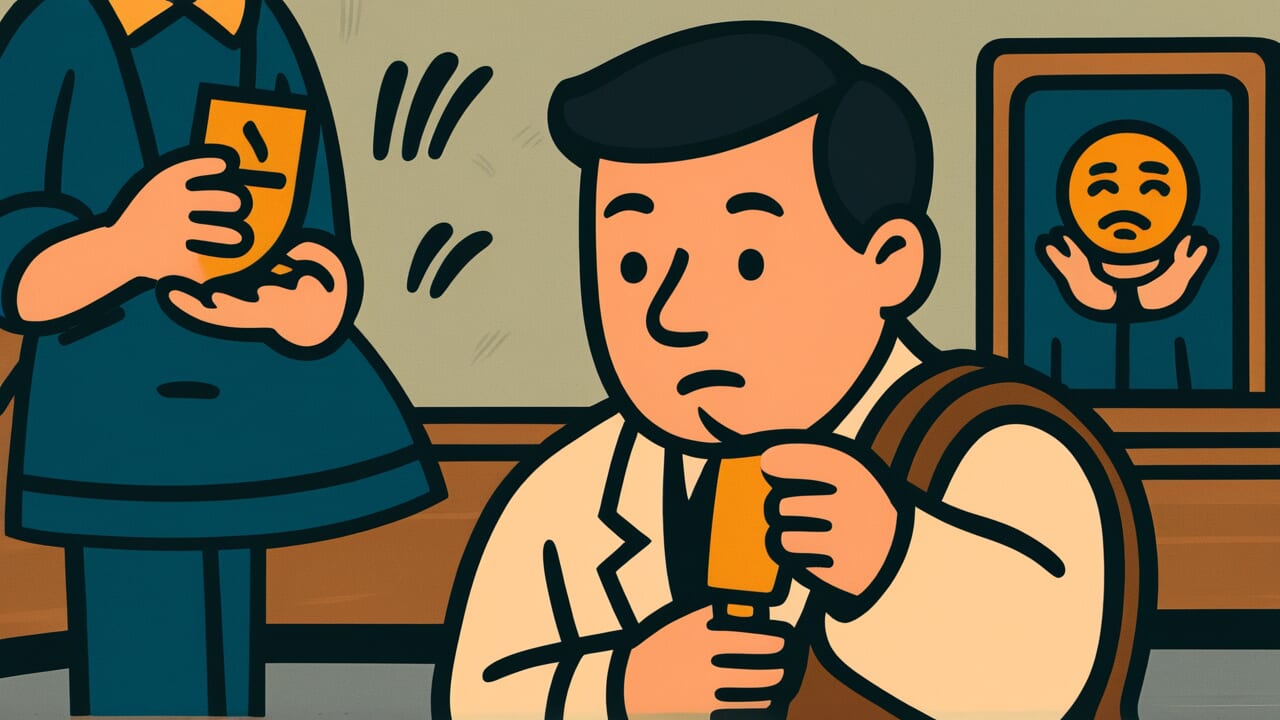How to Read “The smelly one doesn’t know themselves”
Kusai mono mi shirazu
Meaning of “The smelly one doesn’t know themselves”
“The smelly one doesn’t know themselves” means that people find it hard to notice their own flaws and bad points.
People can easily see others’ faults, yet they are surprisingly blind to their own problems.
Just like someone with bad breath or body odor doesn’t notice it themselves, people often remain unaware of their personality flaws or behavioral issues.
This proverb is often used when someone discovers their own problems only after being pointed out by others or noticing people’s reactions.
It also warns about the difficulty of seeing yourself objectively and being too lenient in self-assessment.
Today, it applies to various situations where only the person involved is unaware.
This includes self-centered behavior, bad manners, or problematic ways of speaking.
Even things you think are fine might actually bother those around you.
This proverb teaches the importance of humble self-reflection.
Origin and Etymology
No clear written records explain the origin of this proverb, but we can make interesting observations from how the words are constructed.
The word “kusai” (smelly) mainly means “odor” today.
But in ancient times, it had broader meanings like “suspicious,” “questionable,” or “undesirable.”
This suggests it referred not just to bad smells detected by the nose, but to all “undesirable aspects” of a person’s character or behavior.
“Mi shirazu” means “doesn’t know oneself” or “lacks awareness.”
This expression sharply captures a characteristic of human cognition.
The proverb likely emerged from everyday observations.
People have always experienced the phenomenon where someone with body odor becomes so used to it they don’t notice.
Our ancestors noticed this same “lack of awareness” applied to human flaws and bad habits in general, and created this saying.
Similar expressions appear in moral instruction books from the Edo period.
This suggests the wisdom has been passed down for at least several hundred years.
It’s a distinctly Japanese expression that shows keen human observation.
Usage Examples
- He always interrupts people during meetings, but the smelly one doesn’t know themselves—he hasn’t noticed his own behavior
- People who only write bad things about others on social media are the perfect example of the smelly one doesn’t know themselves
Universal Wisdom
“The smelly one doesn’t know themselves” points to a fundamental blind spot in human cognition.
Why can’t people notice their own flaws?
It’s because we spend the most time with ourselves.
Just as we get used to our own smell, we become completely accustomed to our personality and behavior patterns.
They become “normal” to us.
Furthermore, humans have psychological defense mechanisms that protect the self.
Acknowledging our flaws is psychologically painful, so we unconsciously avoid seeing them.
This proverb has been passed down for hundreds of years because this human trait never changes across time.
Rulers and common people, wise and foolish—no one is completely free from this blind spot.
What’s interesting is that this proverb isn’t just criticism.
It contains deep understanding and tolerance toward humanity.
The expression “the smelly one doesn’t know themselves” carries both resignation—”that’s just how humans are”—and kindness—”so we should point things out and help each other.”
No one is perfect, so be humble.
This is the warm teaching from our ancestors.
When AI Hears This
The human nose has about 400 types of olfactory receptors.
But when you smell the same odor continuously, sensitivity drops by up to 90 percent within minutes.
This happens because the brain judges “unchanging information is unnecessary for survival” and actively blocks the neural signals.
Not noticing your own body odor isn’t just habituation—your brain is actively cutting off the information.
What’s fascinating is how this physiological blind spot has a remarkably similar structure to psychological blind spots.
Research on the Dunning-Kruger effect showed that people who scored in the bottom 12 percent on tests rated themselves in the top 38 percent.
When ability is low, people lack even the ability to recognize “what they can’t do,” so self-assessment becomes abnormally high.
Like olfactory adaptation, the sensor that detects problems has stopped functioning.
Both share another common feature: they can only be resolved by “fresh external stimulation.”
You notice your own smell only when others point it out.
You recognize your lack of ability only through objective feedback.
This proverb brilliantly captures the same vulnerability in human cognitive systems across completely different domains—physiology and psychology.
Lessons for Today
This proverb teaches you the importance of humility and self-reflection.
Now that social media and online communication dominate, opportunities to know how your words and actions appear to others may actually be decreasing.
In screen-based interactions, subtle facial expressions and atmosphere don’t come through well.
Chances to notice your own problems become fewer.
That’s why it’s important to consciously make time for self-reflection.
Ask trusted friends or family for honest opinions.
It might be hard to hear at first, but that’s exactly what will help you grow.
Also, when you notice someone else’s flaws, develop the habit of thinking, “I might have similar blind spots.”
Before criticizing others, question yourself first.
This attitude will truly help you grow.
No one is perfect.
Everyone exists in a state of “the smelly one doesn’t know themselves.”
But the effort to become aware of it is what makes you someone others can trust.



Comments